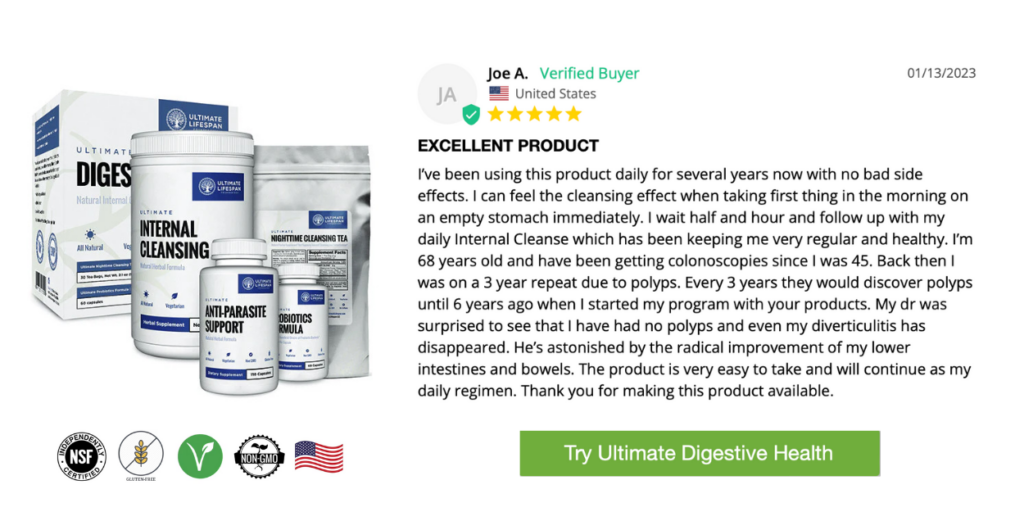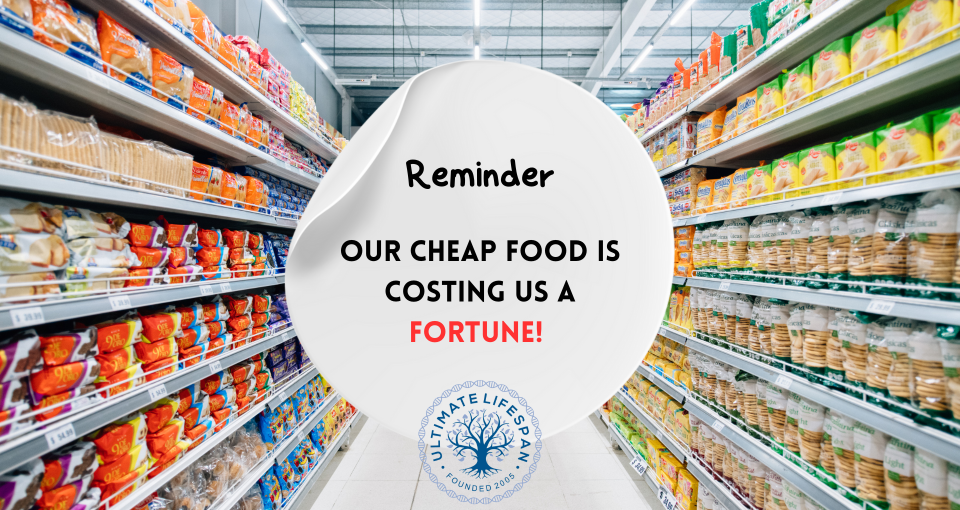Cheap Food is The Most Expensive Food You Can Buy
The emotional, physical, financial, and environmental cost of cheap food can no longer be ignored. It is, in fact, the most expensive food you can buy.
The Real Cost of Cheap Food
Cheap food has widespread devastation. It’s a true emergency! Chronic disease has skyrocketed in every age group, and now we're raising the sickest generation of kids ever. But when you watch media, they would like you to believe that this ultra-processed food that comes in colorful packaging fortified with synthetic nutrients is good for you. Oh, and if you can't digest this non-food, then there's no shortage of over-the-counter drugs to help you with the consequences of that. Tums to the rescue!
We have been misfed and misled by food and drug companies that have no interest in our health, and they are literally leading us off the cliff. Did you know that these so called patient advocacy groups that keep popping up left and right for every new disease they do not want to cure are funded by the same drug companies that want to continue profiting of our disease? Do we really want to be advised by them on our health?
I'm calling you to look up and look around and realize that none of this is normal. It is not normal to be chronically sick most of your life, it is not normal to take multiple prescription medications, it is not normal for our children to have so many behavior issues, it is not normal to spend $4 trillion on healthcare with no real results.
We have literally been led to believe that food made in the chemistry lab is better for us than food made by nature. Why else would we eat fake meat, fake butter, drink fake milk, and demonize nature's perfect foods such as eggs, milk, and bacon that have kept humans healthy for centuries?
Digestive nightmare
All disease begins in the gut. So let’s start with digestion, because if that is off kilter, nothing else will function in the body the way it’s supposed to.
Ultra-processed foods (UPFs) wreak havoc on digestion while offering little to no nutritional value, creating a vicious cycle of poor health. These foods are often stripped of enzymes, beneficial bacteria, and essential nutrients, which are crucial for maintaining a healthy digestive system. This leads to slow bowel movements, constipation and an imbalance in gut microbiota, which can cause digestive disorders like irritable bowel syndrome (IBS), inflammatory bowel disease (IBD), and Leaky Gut. Moreover, UPFs are loaded with additives, preservatives, and artificial ingredients that can irritate the gut lining and disrupt the normal digestive processes.
When the gut is unhealthy, it hampers the absorption of nutrients from the foods we eat, further depriving the body of essential vitamins and minerals needed for overall health. This lack of nutrition perpetuates a cycle of poor digestion and nutrient deficiency, as the body becomes less efficient at processing and absorbing nutrients. The overconsumption of UPFs also promotes overeating and weight gain due to their high calorie and low nutrient content, exacerbating health issues like obesity and metabolic syndrome.
Physical Health Crisis
The physical toll of cheap food is alarming. UPFs contribute to obesity, diabetes, cardiovascular diseases, and certain cancers, just to name a few. In fact, up to 90% of all disease is caused by a bad diet. A diet high in processed foods is strongly linked to an increased risk of type 2 diabetes, as these foods cause rapid spikes in blood sugar and insulin levels. Obesity, another consequence of a UPF-heavy diet, is a major risk factor for cardiovascular diseases and certain types of cancer.
The impact of UPFs on physical health is well-documented. A study published in the BMJ found that higher consumption of UPFs was associated with a greater risk of developing cardiovascular disease (#1 killer) and all-cause mortality. Similarly, research in JAMA Internal Medicine linked higher intake of UPFs to an increased risk of overall cancer and breast cancer specifically.
The link between poor diet and chronic diseases is undeniable, and it’s hard to ignore the irony where these food choices are directly causing the illness which we then treat with pharmaceuticals, which cause even more illness. #1 and #2 causes of death in US are heart disease and iatrogenic causes, which is just a fancy name for death by medicine.
Mental and Emotional Toll
The cost of cheap food on our emotional and mental health is significant. Ultra-processed foods (UPFs) are linked to higher rates of depression and anxiety. These foods lack essential nutrients like omega-3 fatty acids, vitamins, and minerals, which are crucial for maintaining mental health.
Studies have shown that diets high in UPFs can lead to nutritional deficiencies, increased inflammation, and disruptions in the gut microbiota, all of which negatively affect mental health. Moreover, UPFs increase systemic inflammation, further exacerbating mental health issues. The erratic blood sugar levels caused by high sugar content in UPFs can destabilize mood and increase the risk of anxiety, depression, and dementia.
Financial Burden
Financially, the healthcare costs associated with treating diseases linked to poor diet are staggering. The U.S. spends about $4 trillion on healthcare annually, with a significant portion directed toward managing chronic diseases that are preventable through better nutrition. Additionally, the economic burden extends to lost productivity and increased disability claims, further straining the economy.
The cost of managing diet-related chronic diseases is enormous. For instance, the American Diabetes Association estimates that the total economic cost of diagnosed diabetes in the U.S. is $327 billion per year. This includes direct medical costs and reduced productivity. Similarly, cardiovascular diseases cost the U.S. about $219 billion each year, encompassing healthcare services, medications, and lost productivity due to premature death.
Environmental Impact
Environmentally, the production of UPFs is a significant contributor to pollution and resource depletion. The industrial processes involved in creating these foods consume vast amounts of energy and water, and generate large quantities of waste. The reliance on monocultures for ingredients, such as corn and soy, leads to soil degradation and loss of biodiversity.
The environmental impact of UPFs extends beyond their production. The packaging of these foods often involves plastics and other non-biodegradable materials, contributing to the growing problem of plastic pollution. A report by the Ellen MacArthur Foundation highlights that the production of plastic packaging for food is a major source of pollution, with much of it ending up in oceans and landfills.
Moreover, the agricultural practices used to produce the raw materials for UPFs are often unsustainable. The heavy use of pesticides and fertilizers leads to soil and water contamination, affecting ecosystems and human health. Industrial farming has killed and is still pushing out of the food supply many local, sustainable small farmers who take care of the soil and are able to provide nutrient dense foods that we so desperately need!
The Human Cost
The human cost of cheap food is perhaps the most heartbreaking. We're raising a generation of children who are expected to live shorter, less healthy lives than their parents. Childhood obesity rates have tripled since the 1970s, and the prevalence of type 2 diabetes in children, once a rarity, is on the rise. Behavioral issues and mental health disorders are also more common, with studies linking poor diet to conditions such as ADHD and depression, which leads putting these kids on psychotropic medications with dire consequences.
The social implications are profound. Poor health can lead to lower educational accomplishments, reduced earnings, and a lower quality of life. Families bear the brunt of these consequences, with parents having to care for sick children and themselves dealing with the stress and financial burden of chronic illness.
Conclusion: The Real Price of Convenience
The bottom line? The cheap food we're consuming is costing us dearly. It's time to wake up, recognize the true cost of these foods, and make healthier, more sustainable choices for the sake of our health, our economy, and our planet.
We need to demand better from food manufacturers and policymakers. This means pushing for transparency in food labeling, supporting local and sustainable farmers, and prioritizing real nutrition education, not the one coming from big industry funded USDA dietary guidelines. It's about making informed choices and understanding that what we eat affects not just our bodies, but our minds, our wallets, and our world.
This is a public health crisis. Let's choose real food, made by nature, over the ultra-processed, nutrient-depleted options that dominate our grocery store shelves. The health of future generations depends on it.
By integrating these insights and committing to healthier food choices, we can improve our well-being, protect our environment, and reduce the financial burdens imposed by poor dietary habits. It's time to reclaim our health and demand food that nourishes rather than harms. And there’s no time or need for fancy studies to show us what to eat. We know what to eat. All we need to do is look back at our ancestors’ diet – that’s why it’s called ancestral diet. They ate real food and did not suffer from this endless sea of chronic diseases. Here’s another rule of thumb – if a food has a TV commercial, don’t eat it.
Let’s start eating like our life depends on it.
Sources
Centers for Disease Control and Prevention (CDC). “Children's Mental Health.” CDC, www.cdc.gov/childrensmentalhealth/index.html.
National Institute of Mental Health (NIMH). “Mental Illness.” NIMH, www.nimh.nih.gov/health/statistics/mental-illness.shtml.
Frontiers in Nutrition. “Association between ultra-processed foods and risk of cancer: a systematic review and meta-analysis.” PubMed Central, U.S. National Library of Medicine, https://www.ncbi.nlm.nih.gov/pmc/articles/PMC10285062/.
ResearchGate. “Environmental Impacts of Food and Agricultural Production: A Systematic Review.” ResearchGate,https://www.researchgate.net/publication/341787175_Environmental_Impacts_of_Food_and_Agricultural_Production_A_Systematic_Review.
American Diabetes Association. “Economic Costs of Diabetes in the U.S. in 2022.” Diabetes Care, vol. 47, no. 1, 2022, pp. 26-31, https://diabetesjournals.org/care/article/47/1/26/153797/Economic-Costs-of-Diabetes-in-the-U-S-in-2022.
Ellen MacArthur Foundation. “Plastic Pollution.” Ellen MacArthur Foundation,https://www.ellenmacarthurfoundation.org/topics/plastics/examples.


